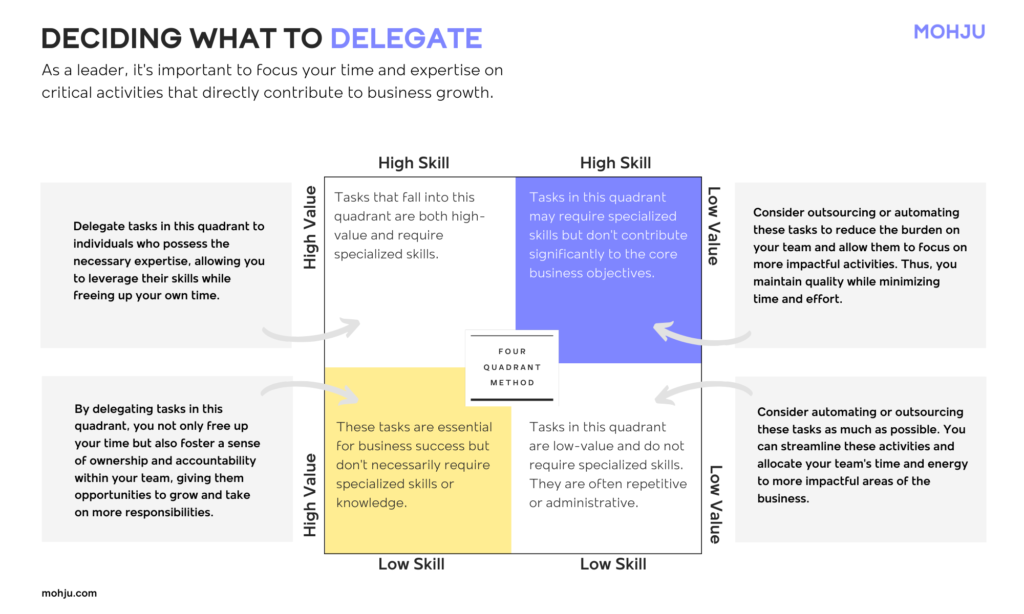This blog post will explore the benefits of quitting micromanagement, embracing automation, and implementing effective delegation strategies. By following these principles, entrepreneurs and business leaders can achieve greater success, productivity, and long-term growth.
Quit Micromanaging and Start Delegating — 4 Ways Successful People Share Responsibility
Micromanagement can stifle creativity, demotivate employees, and limit overall productivity. Instead, successful leaders understand the importance of delegation. By empowering team members and sharing responsibility, they foster an environment of trust, collaboration, and growth.
Here are four ways successful people share responsibility:
- Clearly Define Roles and Expectations: Effective delegation begins with clearly defining roles, responsibilities, and expectations for each team member. This ensures that everyone understands their contributions toward the broader organizational goals.
- Empower Decision-Making: Successful leaders empower their teams to make decisions within their designated roles. By providing autonomy and encouraging critical thinking, they nurture a culture of innovation and accountability.
- Provide Resources and Support: Delegating effectively involves equipping team members with the necessary resources, training, and support to succeed in their delegated tasks. This builds confidence and promotes a sense of ownership.
- Foster Open Communication: Communication is crucial when sharing responsibility. Successful leaders create an environment where open and transparent communication is encouraged. Regular check-ins, feedback sessions, and team meetings enable effective collaboration and problem-solving.
Embracing Automation for Business Sustainability
Automation has revolutionized the business landscape, streamlining processes, improving efficiency, and reducing human error. To scale sustainably, entrepreneurs must embrace automation. Here are key reasons why:
- Increased Efficiency and Productivity: Automation eliminates repetitive and time-consuming tasks, allowing employees to focus on high-value activities. By automating processes such as data entry, inventory management, and customer support, businesses can achieve significant time and cost savings.
- Enhanced Accuracy and Quality: Human errors can have costly consequences. Automation minimizes the risk of errors by ensuring consistent and accurate execution of tasks. This leads to improved quality control and customer satisfaction.
- Scalability and Adaptability: As businesses grow, automation becomes essential for scaling operations. Automated systems can handle increasing volumes of work without sacrificing quality, enabling businesses to meet growing demands efficiently.
- Competitive Advantage: Embracing automation sets businesses apart from their competitors. By leveraging technology to streamline operations and deliver superior customer experiences, companies can gain a significant edge in the market.
Delegating Proactively: A Key to Effective Business Growth
Delegating shouldn’t be a reactive process. Successful entrepreneurs understand the importance of proactive delegation for sustainable business growth. Here’s why:
- Leveraging Expertise and Specialization: Effective delegation allows entrepreneurs to tap into the skills and expertise of their team members. By delegating tasks to individuals who possess the necessary knowledge and experience, businesses can achieve higher-quality outcomes.
- Time Management and Prioritization: Proactive delegation enables entrepreneurs to focus on strategic initiatives and higher-level decision-making. By offloading routine and operational tasks, leaders can allocate their time and energy to activities that drive business growth.
- Developing Talent and Empowering Employees: Delegating proactively creates opportunities for professional growth and development within the organization. By entrusting employees with new responsibilities, leaders foster a culture of continuous learning and empowerment.
The Four-Quadrant Method: Deciding What to Delegate

To delegate effectively, entrepreneurs can use the four-quadrant method, a practical framework for deciding what to delegate. This method helps identify tasks that are best suited for delegation:
Quadrant 1: High Value, High Skill: Tasks that fall into this quadrant are both high-value and require specialized skills. As a leader, it’s important to focus your time and expertise on these critical activities that directly contribute to business growth. Delegate tasks in this quadrant to individuals who possess the necessary expertise, allowing you to leverage their skills while freeing up your own time.
Quadrant 2: Low Value, High Skill:
Tasks in this quadrant may require specialized skills but don’t contribute significantly to the core business objectives. Consider outsourcing or automating these tasks to reduce the burden on your team and allow them to focus on more impactful activities. By leveraging technology or external resources, you can maintain quality while minimizing time and effort.
Quadrant 3: High Value, Low Skill:
These tasks are essential for business success but don’t necessarily require specialized skills or knowledge. Delegating these tasks allows you to empower and develop your team members, giving them opportunities to grow and take on more responsibilities. By delegating tasks in this quadrant, you not only free up your time but also foster a sense of ownership and accountability within your team.
Quadrant 4: Low Value, Low Skill:
Tasks in this quadrant are low-value and do not require specialized skills. They are often repetitive or administrative. Consider automating or outsourcing these tasks as much as possible. By leveraging technology or external resources, you can streamline these activities and allocate your team’s time and energy to more impactful areas of the business.
Loosen Your Grip for Greater Success
Successful leaders understand that loosening their grip on day-to-day operations is essential for achieving long-term success.
By relinquishing control and trusting their team, entrepreneurs can:
- Foster Innovation and Creativity: When leaders step back and allow their team members to take ownership, it creates space for innovation and creativity to flourish. Different perspectives and ideas can emerge, leading to breakthrough solutions and new opportunities.
- Focus on Strategic Initiatives: By delegating operational tasks, leaders can shift their focus to strategic initiatives that drive business growth. They can allocate their time and energy to areas such as market research, product development, and building strategic partnerships.
- Cultivate a Motivated and Engaged Team: Delegation empowers team members and demonstrates trust in their abilities. This fosters a sense of ownership and pride, leading to higher employee engagement, motivation, and job satisfaction.
- Achieve Sustainable Business Growth: By embracing automation and effective delegation, entrepreneurs create a scalable and sustainable business model. They can adapt to changing market conditions, meet customer demands efficiently, and seize growth opportunities with agility.
In today’s dynamic business landscape, quitting micromanagement and embracing automation and delegation is essential for sustainable growth. By adopting proactive delegation strategies, leveraging automation, and trusting your team, you can optimize productivity, foster innovation, and achieve long-term success. Embrace the power of automation and delegation to unleash the full potential of your business and create a thriving, agile organization in the digital age.




